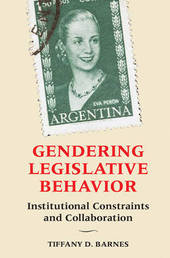
|
Gendering Legislative Behavior: Institutional Constraints and Collaboration
Hardback
Main Details
| Title |
Gendering Legislative Behavior: Institutional Constraints and Collaboration
|
| Authors and Contributors |
By (author) Tiffany D. Barnes
|
| Physical Properties |
| Format:Hardback | | Pages:296 | | Dimensions(mm): Height 235,Width 158 |
|
| ISBN/Barcode |
9781107143197
|
| Classifications | Dewey:328.82082 |
|---|
| Audience | | Tertiary Education (US: College) | | Professional & Vocational | |
|---|
| Illustrations |
4 Tables, black and white; 1 Maps; 39 Line drawings, unspecified
|
|
Publishing Details |
| Publisher |
Cambridge University Press
|
| Imprint |
Cambridge University Press
|
| Publication Date |
4 July 2016 |
| Publication Country |
United Kingdom
|
Description
In democracies, power is obtained via competition. Yet, as women gain access to parliaments in record numbers, worldwide collaboration appears to be on the rise. This is puzzling: why, if politicians can secure power through competition, would we observe collaboration in Congress? Using evidence from 200 interviews with politicians from Argentina and a novel dataset from 23 Argentine legislative chambers over an 18-year period, Gendering Legislative Behavior reexamines traditional notions of competitive democracy by evaluating patterns of collaboration among legislators. Although only the majority can secure power via competition, all legislators - particularly those who do not have power - can influence the policy-making process through collaboration. Tiffany D. Barnes argues that as women have limited access to formal and informal political power, they collaborate more than men to influence policy-making. Despite the benefits of collaboration, patterns of collaboration vary among women because different legislative contexts either facilitate or constrain women's collaboration.
Author Biography
Tiffany D. Barnes is an assistant professor at the University of Kentucky. With the support of the National Science Foundation and the Ora N. Arnold Fellowship, she conducted extensive fieldwork in Argentina, visiting nineteen of the country's twenty-four provinces, collecting a large dataset of legislative activity, and conducting more than 200 interviews with legislators and elite political observers. In 2013 she was a Visiting Fellow at the Kellogg Institute for International Studies at the University of Notre Dame, Indiana. Her articles have appeared in journals such as the Journal of Politics, Comparative Political Studies, Politics and Gender, the Election Law Journal, and the Journal of Women, Politics and Policy.
Reviews'Essential reading for scholars in comparative politics, including those in the fields of Latin American studies, women and politics and legislative studies. While many studies focus on how women can achieve elective office, few examine women's strategies as legislators. This book develops a theory of the conditions under which legislative collaboration is most likely to occur, by focusing on women's legislative behavior. Drawing on both quantitative and qualitative data, Barnes expertly examines legislative collaboration in Argentina, the United States, Rwanda, Uruguay, and South Africa.' Miki Caul Kittilson, Arizona State University 'Barnes's book provides a provocative challenge to traditional views of self-interested and partisan legislators. By showing that they are willing to collaborate across partisan divides, Barnes implies that (especially) female legislators can put policies above partisanship. This important theoretical contribution is backed up by an impressive set of interviews with subnational Argentine legislators and bill cosponsorship data which Barnes combines to tell a compelling story.' Scott Morgenstern, University of Pittsburgh 'Tiffany Barnes's Gendering Legislative Behavior is an important theoretical and empirical contribution to the literatures on legislatures, women and politics, and democracy. Whereas most of the work on legislatures and democracy has emphasized interparty conflict, Barnes explores the conditions under which legislative collaboration across parties occurs. She highlights the relatively greater propensity of women legislators to engage in collaborative behavior. The book is very well researched and written.' Scott Mainwaring, University of Notre Dame 'Barnes proposes a nuanced theory for why women may legislate differently than men. She shows that legislators can be collaborative, women collaborate more than men, but parties can prevent women from collaborating unless they are willing to pay a potentially high cost in terms of their future political career.' Michelle M. Taylor-Robinson, Texas A&M University 'Tiffany Barnes documents in extraordinary detail what are the incentives of women legislators to cross the party line and collaborate with each other on the drafting and approval of legislation. In doing so, this book provides a blueprint for future research that explains legislative cooperation on gender, ethnicity, race, or religion dimensions, as they interact with partisan incentives in democratic politics. This is the best book on legislative politics and gender that I have read.' Ernesto Calvo, University of Maryland
|